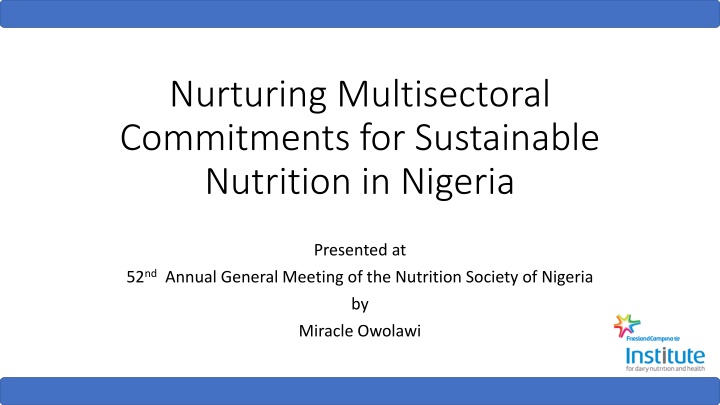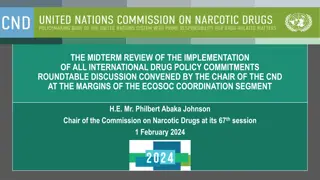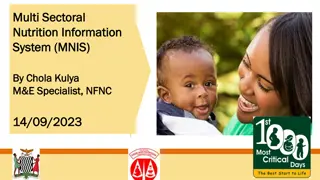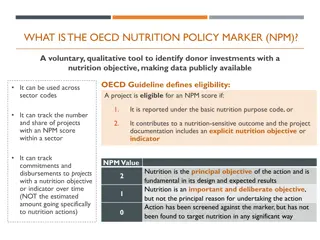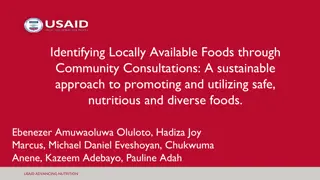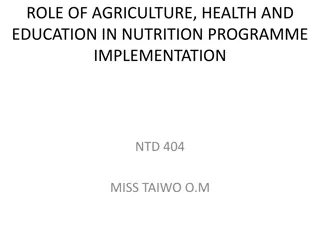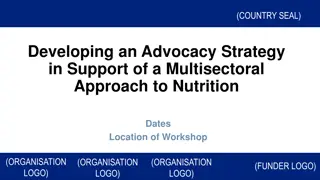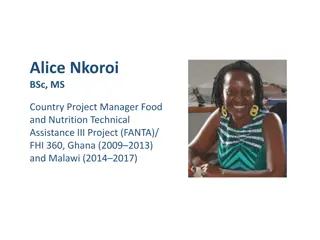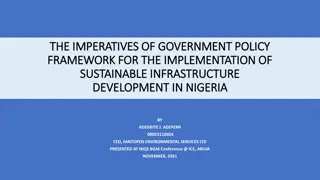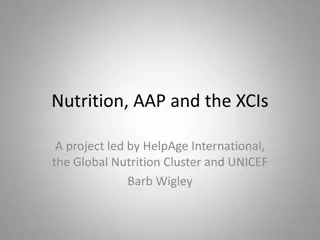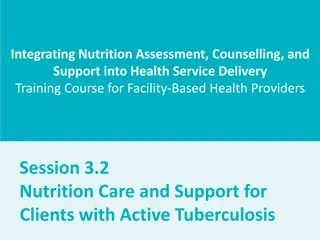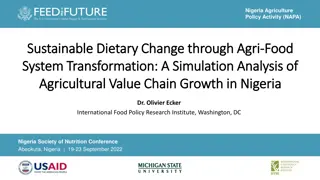Sustainable Nutrition Multisectoral Commitments in Nigeria
Presentation at the 52nd Annual General Meeting of the Nutrition Society of Nigeria highlighting the importance of nurturing multisectoral commitments for sustainable nutrition in Nigeria. The Federal Government identified six priority areas of nutrition for investment in the National Multi-Sectoral Plan of Action for Food and Nutrition 2021-2025. Various sectors such as government MDAs, private sector, and NGOs are actively involved in addressing food and nutrition security in Nigeria through collaborative efforts. The need for a coordinated multi-sectoral approach and global recognition of the importance of nutrition interventions are emphasized.
Download Presentation

Please find below an Image/Link to download the presentation.
The content on the website is provided AS IS for your information and personal use only. It may not be sold, licensed, or shared on other websites without obtaining consent from the author.If you encounter any issues during the download, it is possible that the publisher has removed the file from their server.
You are allowed to download the files provided on this website for personal or commercial use, subject to the condition that they are used lawfully. All files are the property of their respective owners.
The content on the website is provided AS IS for your information and personal use only. It may not be sold, licensed, or shared on other websites without obtaining consent from the author.
E N D
Presentation Transcript
Nurturing Multisectoral Commitments for Sustainable Nutrition in Nigeria Presented at 52ndAnnual General Meeting of the Nutrition Society of Nigeria by Miracle Owolawi
Where Are We? Source: GNR, 2021
Multi-Sectoral Plan of Action The Federal Government of Nigeria identified the six priority areas of nutrition for investment reflected in the National Multi-Sectoral Plan of Action for Food and Nutrition 2021-2025 Food and nutrition security Enhancing caregiving capacity Enhancing provision of quality health services Improving capacity to address food and nutrition insecurity Raising awareness and understanding of the nutrition problem in Nigeria Resource allocation for food and nutrition security at all levels.
What Role is Each Sector Playing? Government MDAs (Health, Agriculture, Finance/Budget) Mandate for relevant MDAs Private Sector FrieslandCampina Institute Academic Problem solving research, capacity building NGOs Non State Actors CSOs - CS-SUNN Youth Advocacy Act4Food Act4Change
Governmental Structure
How Do They All Come Together? There is global recognition that food security and nutrition are determined by a complex web of interacting physical, social, and biological determinants1. They must be addressed through coordinated multi-sectoral, private, and public sector programming, including agriculture and environment; water, sanitation and hygiene; health; education; and governance2 The Lancet released a series of papers reviewing progress toward improving nutrition around the globe. The authors stated that a multi-sectoral approach is required to achieve global targets for reducing undernutrition, along with scaling up proven nutrition-specific interventions and strengthening nutrition-sensitive interventions that span a variety of sectors
Exemplar Countries Ghana One main strategy Ghana adopted in achieving an impactful nutrition multisectoral collaboration is situated planning. Ghana has all of its multi-sectoral actions situated within a national planning system. All actions and government priorities, including Food and Nutrition Security (FNS) have been situated within this national system. The multisectoral collaboration also has an FNS Cross Sectoral Planning Group (CSPG) to coordinate actions from government, CSOs, Development Partners/Donors, Research and Academic institutions and Business
Key Recommendations How do we get there? Accountability Framework Strengthening existing structure and situation of the collaborative mechanism Private Sector Collaboration Sustainable Funding
